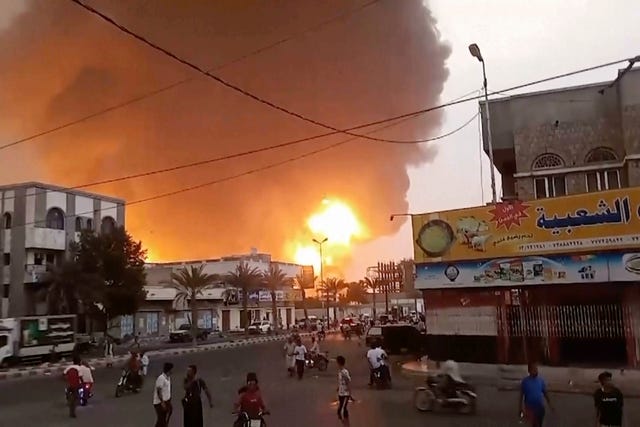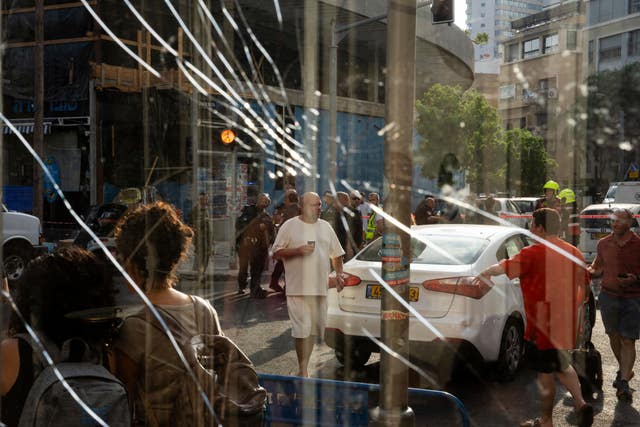The Israeli military has said it intercepted a missile fired from Yemen early on Sunday, hours after Israeli warplanes struck several Houthi targets in the Arabian peninsula country.
The Israeli air strikes – in response to a deadly Houthi drone strike on Tel Aviv – mark the first time Israel is known to have responded to repeated Houthi attacks throughout its nine-month war against Hamas.
The Health Ministry in Yemen said the Israeli strikes killed six people and wounded 83 others, many with severe burns. Another three people were missing, the ministry said in a statement shared by the Houthi-run al-Masirah TV.
The burst of violence between the distant enemies has threatened to open a new front as Israel battles a series of Iranian proxies across the region.
The Israeli army late on Saturday confirmed the air strikes in the western Yemeni port city of Hodeidah, a Houthi stronghold.
It said the strikes, carried out by US-made F-15 and F-35 warplanes, were a response to hundreds of Houthi attacks.

The Israeli military said Saturday’s air strikes, some 1,000 miles from Israel, were among the most complicated and longest-distance operations by its air force. It said it hit the port because the area is used to deliver Iranian arms to Yemen.
The Israeli attack unleashed a massive fire in Hodeidah’s port.
Israel’s defence minister, Yoav Gallant, said: “The fire that is burning now in Hodeidah is seen across the Middle East and the significance is clear.”
He vowed to carry out similar strikes “in any place where it may be required”.

On Sunday, the Israeli military said the surface-to-surface missile fired from Yemen was intercepted before reaching Israeli territory.
The Houthis are among several Iranian-backed groups to have attacked Israel in solidarity with Hamas since the October 7 attack by the Palestinian militant group triggered the ongoing Israeli offensive in Gaza.
In addition to fighting Hamas, the Israeli military has been engaged in daily clashes with the Hezbollah militant group in Lebanon. These clashes have raised concerns that the fighting could spill over into a full-blown war with Lebanon and beyond.
The Hodeidah port is also a gateway for supplies to enter Yemen, which has been engulfed in civil war since 2014, when the Houthis seized much of northern Yemen and forced the internationally recognised government to flee from Sanaa. A Saudi-led coalition intervened the following year in support of government forces, and in time the conflict turned into a proxy war between Saudi Arabia and Iran.
The war has killed more than 150,000 people, including fighters and civilians, and created one of the world’s worst humanitarian disasters.
Abdul-Malek al-Houthi, leader of the rebels, said: “The Israeli enemy picked those targets specifically as part of their targeting of the Yemeni economy.”
On Sunday, officials said that the Houthis repeatedly targeted a Liberia-flagged container vessel in the Red Sea, the latest assault by the group on the crucial maritime trade route.
The captain of the ship reported attacks from three small Houthi vessels, an uncrewed Houthi aerial vehicle and missile fire off the coast of Mocha, Yemen, resulting in “minor damage” to the ship, the British military’s United Kingdom Maritime Trade Operations Centre said.
The Joint Maritime Information Centre, a coalition overseen by the US Navy, identified the ship as the Pumba and reported “all crew on board safe”.
Early on Sunday, the Houthis claimed responsibility for the attack on the Pumba.
Analysts and Western intelligence services have long accused Iran of arming the Houthis, a claim Tehran denies. The joint force airstrikes so far have done little to deter them.
The Houthis have long-range ballistic missiles, smaller cruise missiles and “suicide drones,” all capable of reaching southern Israel, according to weapons experts. The Houthis are open about their arsenal, regularly parading new missiles through the streets of Sanaa.
On Sunday it emerged that Israeli airstrikes killed at least 15 people including women and children overnight in Gaza, according to hospital officials and a body count by an Associated Press journalist.
The latest strikes occurred as Israeli Prime Minister Benjamin Netanyahu prepared to leave on Monday for the United States, where he is expected to meet President Joe Biden and address Congress to make his case for the nine-month war against Hamas while ceasefire negotiations continue.






